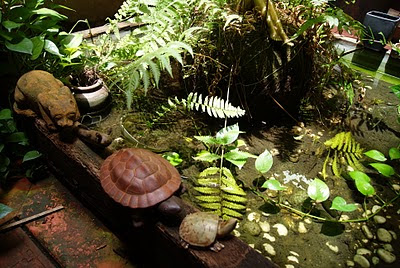I have been practicing yoga since my
freshman year at Emerson College. I never feel better than when I have a
regular, daily yoga practice, but I have a hard time being as disciplined and
dedicated as I would like when it comes to maintaining an at-home
self-practice. When no one is looking, it’s much easier to be lazy. For the
first year of our time in Thailand, we weren’t living anywhere that had yoga
classes. It was a very lazy year. But, finding myself in a city with an expat
community I set out to find yoga somewhere.
I found two places in Chiang Rai: one, a pseudo-hippie café
catering to foreigners, the other, marked with a sign all in Thai, except for a
picture of people doing yoga and the number 700. It was time for a comparison.
First, I went all-Thai. Since I couldn’t find any info
online, I stopped by to ask for times, prices, etc. The woman who greeted me
spoke little English and repeatedly said, “Thai language.” Three classes a day,
60 baht ($2) a class or 700 baht ($23) a month, definitely worth a try. I
assumed she meant she only spoke
Thai. I was wrong. She meant the instructor spoke Thai during class. Oh well,
no different from the rest of my life here.
Then, I went to try out the hippie expat café, although with
some reservations. I don’t mean to sound judgmental, but many of the foreigners
we meet aren’t exactly my cup of tea, which is why I had put off going for
several months. I find them to be pompous and abrasive. Backpackers in Aladdin
pants, talking about full moon parties and how awesome and fucked up they were,
or spouting pseudo-spiritual dribble; I just can’t take it. And spending so
little time around English speakers makes it even more difficult to be forced into
listening to them ramble on about themselves. (I know I sound bitter, but
feelings build up after a year and a half.)
Turned out, they had to cancel their yoga classes for lack
of a teacher, but hadn’t updated their website. So, I pedaled on over to my
Thai yoga class instead, making it just in time.
Turns out, I adore taking a yoga class in a foreign
language. The instructor, a delightful man with a wonderful sense of humor, a
big smile, and a fantastic energy about him, does speak some English, particularly
yoga-oriented English. He probably speaks enough to teach a full, not very
detailed, class in English.
Three months ago, he was very heavy on the English, clearly
for my benefit. However, as the classes generally follow a standard ashtanga
series and I have been doing yoga since 2005, his English usage has dropped
down to practically nothing. When he does say something in English, I know it
is directed at me, which is just lovely. He leads a wonderful, challenging class and
the Thais enjoy themselves and are all willing to attempt anything. Just last
night, we did headstands, handstands, and forearm stands all in one class.
Occasionally there will be another foreigner or two, and the
class gets and injection of English, but not very often. My Thai comprehension,
while still pathetic, is also dramatically improving.
Okay, only yoga-specific
Thai, but it’s something.










































